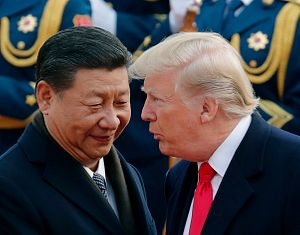Trade war has been joined. This morning, the United States Trade Representative released a list of sanctions against Chinese goods. China immediately replied with a promise of counter-sanctions against U.S. goods. The reasoning behind the sanctions mostly revolves around the threat posed by China to American intellectual property, manifest in Chinese industrial policy, technology transfer policy, and industrial espionage.
This action represents an abrupt reversal of the May 20 declaration that the United States and China would “put the trade war on hold.” But then unpredictability is a hallmark of the Trump administration; indeed, there is good reason to believe that Trump thinks unpredictability is an asset in international negotiations. But it’s worth wondering precisely how the United States is thinking about this trade war. Wars should have a point; it makes it so much more interesting for the participants. And there’s some question as to whether the goal of this war is to make trade with China more fair, or simply to inflict pain on the PRC.
To begin with, the United States is not on sound footing with respect to international trade practice. Chinese technology transfer policies, for example, are completely legal under international trade law. China can make foreign investment and joint ventures contingent upon technology transfer; many countries do this, and private firms are under no obligation to deal with China if they do not wish to comply with these rules. China is also within its rights to subsidize domestic firms. Moreover, the multilateral system of trade management has improved Chinese practice. Almost everyone agrees that foreign technology has become less important to the Chinese economy; almost everyone agrees that Chinese intellectual property practice has improved; almost everyone agrees that cyber-espionage of trade secrets by Chinese actors has decreased (although how much remains the subject of controversy). If the purpose of policy is to improve China’s intellectual property (IP) practices, then it has been wildly, shockingly successful. By virtually every metric, and across every field of IP, Chinese IP protection has grown broader and deeper. China is now at worst a mediocre IP citizen.
But then purpose of the WTO is to ensure fair trade practices; it is not to break the Chinese economy. Very possibly, the Trump administration has decided that it prefers the latter to the former. The trade war that Trump has initiated will hurt the United States, but the hope appears to be that it will hurt the Chinese more. This belief is based on two articles of faith; that the United States has an inherently innovative economy, and that China has an inherently non-innovative economy. It is likely that neither of these are true, but we’re about to find out.
There is surely a great irony in the fact China appears to have the better of the United States in the massive multilateral trade system that the United States painstakingly constructed over the past seventy years, and pushed China into joining. But as in so many other areas, the Trump administration seems to committed to tearing down the scaffolding that the United States has so carefully constructed over the last seventy years. Along with other moves, it also suggests that the Trump administration has a distinctly zero-sum understanding of the world, especially with regard to trade. And there is also irony in this, because trade is, by definition, a positive sum undertaking.

































